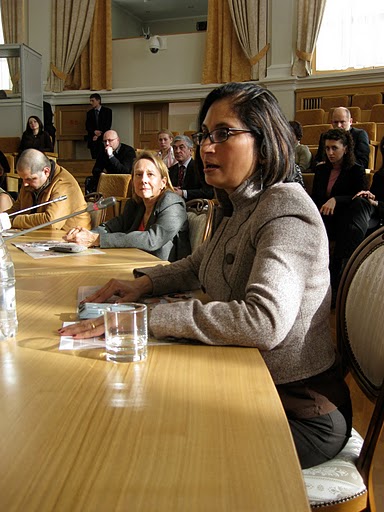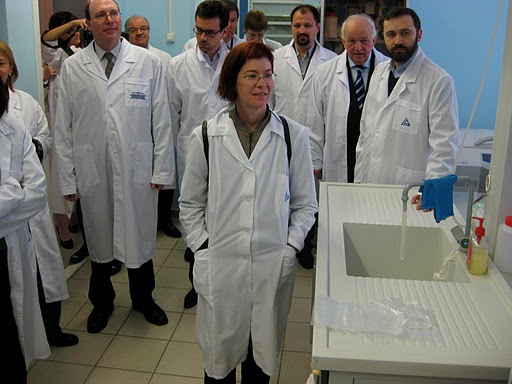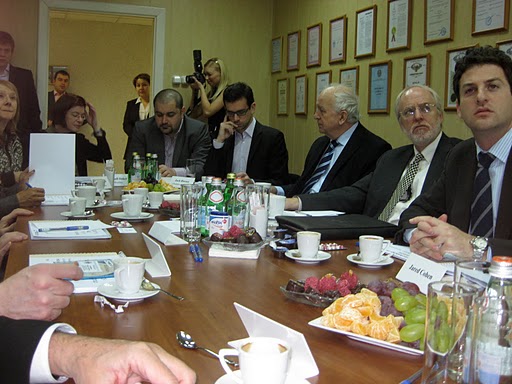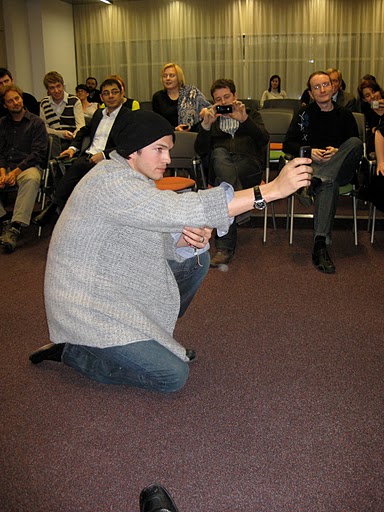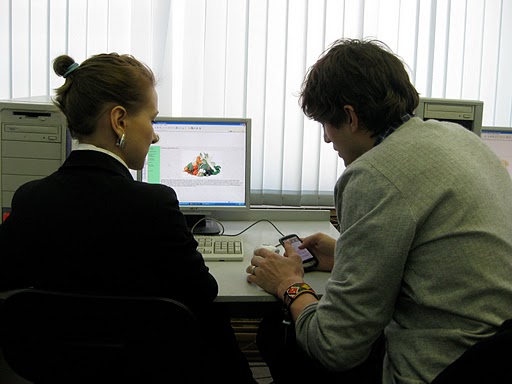The idea of a U.S. government led delegation of high-technology CEOs to Russia may seem strange, particularly when the mission was to forge partnerships on education, health, anti-trafficking, anti-corruption, and e-governance. However, I would argue that in an era where we are looking to practice 21st century statecraft, the "strange" label is often an indication that we are trying something new. The risk-averse culture that characterized our previous approach to Russia has been "reset" and the barriers to collaboration have been shattered by the spirit of partnership and the shared resource of innovation.
Several weeks ago, CEOs and senior executives from eBay, EDventure, Cisco, Mozilla, Howcast, Twitter, Social Gaming Network, Katalyst, and the NY Academy of Sciences took part in the first ever U.S.-Russia Innovation Dialogue. And this was certainly new and anything but risk-averse. The delegation traveled to Moscow and Novosibirsk (yes, Siberia in February) to engage with Russian government stakeholders, civil society, students, academic leaders, and private sector entities from a cross-section of Russian society. In the lead-up to the Dialogue, people were skeptical that a group of techies--most with little background on Russia--could achieve any real deliverables. But we had a hypothesis that their expertise could lend itself to innovative solutions that leverage both U.S. and Russian innovative capacity to address key global challenges. It was a calculated risk as we asked these executives to take off their corporate hats, put on their expert hats, and bring their knowledge of technological tools to diplomatic conversations with government, civil society, local private sector, and students.
During the Cold War, such a Dialogue would not have been possible as both the Russians and we viewed innovation as a zero-sum game. Now innovation is perhaps our most important shared resource. America may have Silicon Valley, but Russia is home to some of the most impressive software designers in the entire world and has an increasingly vibrant tech industry. And with Russia looking to build a Silicon Valley of its own, the tech experts that Russia covets for guidance and advice may perhaps be some of our most important diplomats. After all, ridden in a vibrant technology industry are critical democratic values like the free exchange of ideas, the opportunity for upward economic mobility, and empowerment of citizens for greater accountability and transparency.
The high-tech delegation, co-led by National Security Council Director for Russia Howard Solomon and me from the Secretary of State's Policy Planning Staff, demonstrated the "reset" in U.S.-Russia relations and President Obama's policy of dual-track engagement in action. We were also joined for part of the delegation by White House Chief Technology Officer Aneesh Chopra. As illustrated by this unprecedented Dialogue, the "Reset" is much more than government-to-government meetings on START and Iran; it also entails government officials engaging non-governmental actors, including NGOs, entrepreneurs, students, and professors. At the core of this policy is the creation of linkages between non-governmental Americans and their Russian counterparts, and with Russian government interlocutors to find areas of mutual interest and seek out new opportunities for collaboration. At a time when modernization is being debated in Russia, it is precisely this sort of engagement that contributed to meaningful discussions on creating the right econosystem conducive to fostering entrepreneurship and innovation and led to concrete cooperation.
This type of dual-track engagement mixed with innovative approaches to diplomacy sparked lively and frank discussions on the important roles that openness, transparency, and freedom of expression play in such an environment. Specifically, the themes we focused on--anti-corruption, anti-trafficking, education and cultural exchange--all stem out of the U.S.-Russia Bilateral Presidential Commission Working Groups on Civil Society and on Education, Culture, and Mass Media.
In a diplomatic tactic never before deployed by the State Department, the delegation live streamed their meetings off of iPhones and Androids transforming small meetings into global conversations. Tools such as Twitter allowed up to 15 million people around the globe to follow, sometimes with tweets, re-tweets, links to media articles and blogs, and real-time crowd-sourced translation during the course of the trip.
So beyond a neat idea and lots of people watching, what actually came of this? For starters, we have routinely talked to Russian stakeholders about health, education, anti-trafficking, anti-corruption, and e-governance; but we have never done so with this particular set of stakeholders in the room. But if we accept the fact that to some extent statecraft is formalized troubleshooting, introducing a new set of stakeholders to the mix--in particular a bunch of techies--helped generate a set of solutions that government and civil society alone could not have developed.
While Secretary Clinton is in Russia engaging government and non-government stakeholders, the private sector participants in the U.S.-Russia Innovation Dialogue are hard at work driving forward twenty deliverables that will rely on private sector resources and capacity. Acting as a convener, a facilitator, and a conceptual partner, the U.S. Innovation Dialogue has become an important example of the "reset" in action by committing to the following 20 deliverables:
Theme 1: Education, Entrepreneurship Training, and Mentorship
- U.S.-Novosibirsk IT Internship program: Recognizing the strong legacy of education in science and technology in Russia, the U.S. innovation delegation participants have agreed to establish 6-month internships in Silicon Valley. These internships are designed to expose Novosibirsk's most promising young engineering talent to the Silicon Valley entrepreneurial experience, culture, and environment. The internships will be designed to cultivate a renewed interest in science and technology and expose interns to models and mentoring that could foster entrepreneurship and social development in Russia.
- Establish Pilot Incubators in Select Regions of Russia. In an effort to foster greater entrepreneurship and establish innovation hubs, members of the Innovation Delegation will create entrepreneurship incubators in St. Petersburg and Novosibirsk that are linked to specialized incentives (e.g. subsidized accommodation, moving expenses, etc.).
- Exchange of Experiences and Best Practices. Members of the Innovation Delegation will offer their expertise and intellectual collaboration as the Russian government pursues creating its own entrepreneurship incubators.
- Public Awareness Campaign to Foster Entrepreneurship. Members of the Innovation Delegation will partner with Russian government, private sector, and media entities to celebrate Russian entrepreneurial heroes/role models and cultivate self-confidence in taking risks, learning from failures, and striving to succeed with new and innovative business ideas.
- X-Prize collaborations in education and health. The Innovation Delegation, in coordination with the X Prize Foundation, is investigating the design and implementation of health and education-related X Prizes relevant to Russia.
- Establish a U.S.-Russia Young Scientists Innovation Network. NY Academy of Sciences will partner with Russian stakeholders to promote career mentoring and the development of "frontiers of sciences" communities. The mechanisms through which this network will exist are physical events in Russia, web-based exchanges, global memberships, travel exchanges, and competitions with prizes.
- Make lectures available online. Innovation Delegation will partner with Russian institutions of higher learning to provide lectures and coursework that can be made available to the general public.
- Institutionalize a dialogue between Silicon Valley and Academic institutions. Innovation Delegation will work with Academic institutions to develop a platform through which experts in the industry can virtually provide perspectives, mentorship, and insights that aspiring entrepreneurs can learn from.
Theme 2: Anti-trafficking and child protection
- U.S.-Novosibirsk Digital Kids Pilot Project: The Innovation delegation has agreed to provide laptops, computer accessories, and teacher training to Novosibirsk's city and state run orphanages.
- Establish Competition to Promote Technology Solutions to Fight Human Trafficking. Working with Russian private sector and other stakeholders, the Demi and Ashton Foundation has agreed to establish a50,000 prize for Russian software developers and engineers to create new technology tools to prevent trafficking in women and children.
- Create Safe Jobs Index and Trafficking Violators "Most Wanted" List. Working with international non-governmental organizations focused on anti-trafficking and relevant government agencies, the Demi and Ashton Foundation will create a safe jobs index to assist young women in finding safe employment. A list of identified and convicted traffickers will also be compiled and distributed where in accordance with national legislation.
- Develop Anonymous Mobile Message-Based Platform for Reporting Cases of Trafficking. The Innovation delegation will partner with Russian mobile services, Internet providers, civil society actors, and Russian law enforcement authorities, to implement an anonymous mobile message program to alert authorities to possible trafficking cases, collect geo-tracking data, and share information on the web.
- Establish Public Awareness and Classroom Education Campaign. Working with social media and networking organizations, develop a public awareness campaign on the harms of trafficking that includes an in-class educational curriculum. The Demi and Ashton Foundation will establish prizes for the development of content-based public awareness tools and programs.
- Tech/Civil Society Conference. Innovation Delegation will work with the local technology sector to facilitate a conference that links technology stakeholders and civil society organizations based on a shared interest in addressing trafficking, health, education, and anti-corruption.
Theme 3: Combating Cyber-crime
- Establish Public-Private Sector Partnerships to Strengthen Cyber Security: Establish a process through which private sector companies interested in investing in Russia can raise issues of cyber crime with the government. We can do this by providing points of contact in U.S. and Russian law enforcement agencies to private sector information technology companies to collaborate in our efforts to fight cyber crime.
- Develop Alternative Livelihoods for Cyber Criminals or Those Susceptible to Committing Cyber-Crime. Participants will engage with relevant government and private sector entities and other stakeholders to develop means to provide programmers legitimate and profitable uses for their talent.
Theme 4: Health
- Text4Baby: Given the high priority President Obama and President Medvedev have placed on promoting maternal and infant health, Healthy Russia Foundation will partner with Russian mobile service providers, software developers, Russian health industry representatives, and Russian health authorities to establish a mobile message program where pregnant women and new mothers can receive weekly alerts and advice to help those maintain a healthy lifestyle for themselves and their babies. More important, this program provides a platform for women to consult directly with health professionals as appropriate. (A model for this program was recently announced by the U.S. White House. For more information, please see www.text4baby.org)
Theme 5: E-governance and Collaboration
- E-governance and collaboration: U.S. Chief Technology Officer Aneesh Chopra and the Deputy Prime Minister Sergey Sobyanin will collaborate broadly on e-governance issues, such as the development of platforms for making government data accessible to the public.
Theme 6: Promoting Cultural Collaboration
- Integrate technology into the Moscow Arts Theater. To celebrate our respective cultures and broaden our understanding of one another, the Innovation Delegation will work with the Moscow Arts Theater to assess their technology needs, provide technical assistance, and facilitate partnerships to use technology to extend the cultural reach of the Moscow Arts Theater and deepen connections between theater students in the United States and Russia.
- Forge partnerships between U.S. and Russian local media outlets. Recognizing the growth of the digital media environment, local media outlets in both the U.S. and Russia share common challenges of survival and adaptability. As such, we will work together in the Bilateral Presidential Commission's Working Group on Education, Culture, Mass Media and Sports to facilitate exchanges and build partnerships that will address the shared challenges and identify opportunities to take advantage of the changing media environment.

